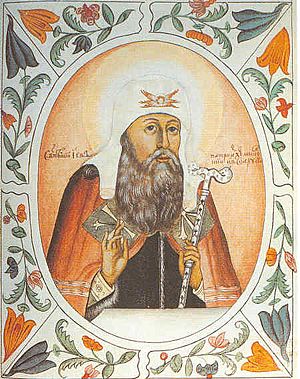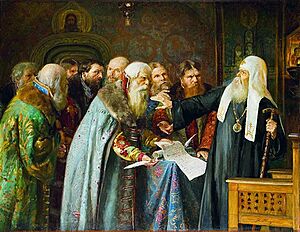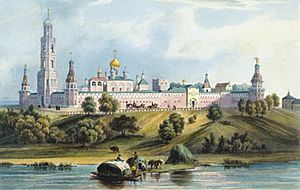Patriarch Job of Moscow facts for kids
Quick facts for kids Job |
|
|---|---|
| Patriarch of Moscow and all the Rus' | |
 |
|
| Church | Russian Orthodox Church |
| See | Moscow |
| Enthroned | 26 January 1589 |
| Reign ended | June 1605 |
| Successor | Ignatius |
| Personal details | |
| Birth name | Ioann (Russian: Иоанн) |
| Born | unknown Russia |
| Died | 19 June 1607 Staritsa |
| Buried | Dormition Cathedral, Moscow |
Job (Russian: Иов, Iov), also known as Job of Moscow, was a very important leader of the Russian Orthodox Church. He lived from an unknown date until June 19, 1607. He became the very first Patriarch of Moscow and All Russia. A patriarch is like the highest bishop in a church. The Russian Orthodox Church honors him as a saint.
Before becoming patriarch, Job was the Metropolitan of Moscow and all Rus' from 1587 to 1589. This was a high position, but it was usually approved by the Patriarch of Constantinople. Job was the seventeenth Metropolitan in Moscow to be appointed without this approval. However, in 1589, Jeremias II, the Patriarch of Constantinople, officially recognized Job's position. He then raised Job to the even higher rank of patriarch.
Contents
Early Life and Becoming a Monk
Job's birth name was Ioann, which is like "John." When he was a teenager, Ioann knew many parts of the Bible by heart. He really wanted to become a monk, which is a person who dedicates their life to religious service. But his father wanted him to get married instead.
One day, Ioann asked his father if he could visit his confessor at the Uspensky Monastery. This monastery was in their hometown of Staritsa. When Ioann arrived there in 1551, he immediately decided to become a monk. He took special vows and changed his name to Job.
Rising Through the Church Ranks
Job lived in the monastery for fifteen years. In 1566, he became the abbot, or head, of the monastery. This happened with help from Ivan the Terrible, a powerful Russian ruler. Ivan the Terrible had made Staritsa his home during a difficult time in Russian history called the Oprichnina.
People knew Job as a humble and honest man. He was also very learned for his time. He worked hard to help the church and spread the Christian faith.
In 1571, Job moved to Moscow. There, he became the abbot of the Simonov Monastery. A few years later, in 1575, he became the abbot of the Novospassky Monastery. Then, in 1581, Job was made the Bishop of Kolomna.
Job was very good at reading long prayers from memory. He read them in a powerful and expressive way. This talent caught the attention of Boris Godunov, who was a very influential person in Russia.
During the rule of Tsar Feodor I, Boris Godunov was the real power behind the throne. In 1587, Job was appointed as the archbishop of Rostov. Soon after, he became the Metropolitan of Moscow and All Russia.
Becoming the First Patriarch
Boris Godunov understood that the church in Russia needed to be stronger. He convinced Jeremias II, the Patriarch of Constantinople, to create a new, higher church position in Russia. This new position was called a patriarchate.
On February 5, 1589, Job was chosen to be the first Patriarch of Moscow and All Russia. He used his influence to help Boris Godunov become the new Russian tsar.

However, Job did not agree with all of Godunov's ideas. For example, Godunov wanted to open a university in Moscow with teachers from other countries. Job worried that these foreign teachers, who were not Orthodox Christians, might spread different beliefs. He thought this could harm the purity of the Russian Church.
Under Job's guidance, Russian church leaders worked to correct and publish important religious books. He also helped to officially recognize some Russian saints. For example, he ordered celebrations for Basil Fool for Christ in 1588, and for Joseph Volotsky and others.
Patriarch Job also supported building new churches and monasteries. He encouraged Christian missionary work in newly conquered areas like the Astrakhan Khanate and Siberia. He even exchanged gifts with the leader of the Georgian Church, Catholicos Nicholas V of Georgia.
In 1591, a young prince named Dmitry Ivanovich died. Job was part of the official investigation into his death. After talking with church leaders and noblemen, the patriarch announced that the prince had accidentally stabbed himself. He supported Boris Godunov's view on this matter. In the same year, Job also founded the Donskoy Monastery in Moscow.
Job's Role in Russian History
After Tsar Feodor I died, his wife, Irina Godunova, refused to become the new ruler. So, in 1598, Patriarch Job became the head of the country.
Since Boris Godunov had helped Job become patriarch, Job supported Godunov to become the next tsar. On February 21, 1598, Job led a religious procession to Boris Godunov. He begged Godunov to accept the throne.
Later, a man known as False Dmitry I claimed to be the dead Prince Dmitry. Job strongly disagreed with this claim. He tried to convince the people of Moscow to stay loyal to the deceased tsar. However, supporters of False Dmitry I broke into the Cathedral of the Dormition. A nobleman named P. F. Basmanov declared Job a traitor.
Job was officially removed from his position on June 24, 1605. The church council said he was retiring because of old age and poor health. Job was sent away to his monastery in Staritsa, where he became completely blind.
Job was replaced by Archbishop Ignatius of Ryazan. Job only returned to Moscow after False Dmitry I was killed. Patriarch Ignatius was then imprisoned, and Vasili IV of Russia became the new tsar.
On February 20, 1607, Tsar Vasili Shuisky asked Patriarchs Hermogen and Job to lead a special church service together. This service took place at the Dormition Cathedral in the Moscow Kremlin. During the service, Job forgave the people of Moscow and gave them his blessing.
Death and Legacy
Job died as a very sick man in 1607. In 1652, his remains were moved to the Cathedral of the Dormition in the Moscow Kremlin. They are still there today.
In 1989, Patriarch Job was officially recognized as a saint by the Russian Orthodox Church.
 | Victor J. Glover |
 | Yvonne Cagle |
 | Jeanette Epps |
 | Bernard A. Harris Jr. |


